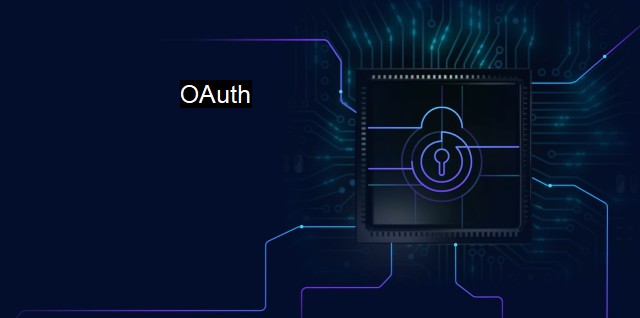What is OAuth?
Enhanced Security and User Control: Understanding OAuth, The Authentication Protocol for Secure Access to Online Resources
Simply put, OAuth, short for Open Authorization, is a standard protocol for authorization that provides applications the ability to access user data from other applications, usually large ones such as Facebook or Google, without needing their password details.OAuth is an essential mechanism that protects a user's password and uses authorization tokens instead. It allows third-party services to access specified aspects of your data without needing access to all of your personal information.
To understand this better, think about when you download a new application and during the signup process, you're given the option to 'Continue with Google' or 'Continue with Facebook'. By choosing one of these options, these applications utilize OAuth to gain limited access to your Google or Facebook data – like your name and email address – verifying your identity without needing your login credentials for these platforms. This means the application never sees or stores your personal password for any platform which you've used for verification.
OAuth provides an additional layer of security because it restricts the amount of personal information that is shared while preventing exposure of your login credentials. Technically, OAuth operates by using a token-based system. Instead of handling user credentials such as usernames and passwords, it deals with tokens issued by an authorization server.
OAuth serves not only to offer a streamlined user experience – reducing the need for multiple accounts and thus, numerous usernames and passwords for a user to remember – but also as a fundamental form of cybersecurity. It plays a crucial role in controlling and limiting the access scope of third-party applications, thereby reducing the likelihood of account compromise because even if the token is stolen, the attacker doesn’t gain full control of the user's account.
In addition to this, OAuth also provides various other advantages in terms of security. One of these is that the third-party apps only have access to the token, which has a finite lifetime, for a certain duration - not like passwords that can potentially provide long-term access if not regularly modified.
Unlike typical password-based accesses, tokens can be configured and allowed to serve only particular purposes thereby restricting access as needed. As a user, you can determine which specific information the third-party app can obtain, hence maintaining a level of control over the data sharing taking place.
On the contrary, just like any other technology models, OAuth is not entirely impervious to cyber threats. Since the introduction of this authorization format, various vulnerabilities have also been exposed, and some attacks have taken advantage of these weaknesses. Consequently, continuous effort is put into detecting and addressing these vulnerabilities to better protect user information. Therefore, OAuth’s creators, as well as countless third-party developers, are continually enhancing its security to protect against cyber threats.
Concerns over cybersecurity and practices to counter threats in the virtual sphere are a conversation that never ends. In this scenario, OAuth offers a light in the dark, providing a secure and convenient way to authorize third-party applications access to user account data. It enables users to share certain features of their account information while keeping their private login credentials confidential. At the same time, we should also stay vigilant and mindful about the in-built potential risks in authorizing applications and the information they gain access to, as the Internet is not making cyber threats extinct anytime soon.

OAuth FAQs
What is OAuth?
OAuth is an open authentication protocol used to provide authorization between different parties on the internet without exposing passwords. It allows users to grant third-party applications access to their data without sharing their passwords.How does OAuth work in cybersecurity?
OAuth can help enhance cybersecurity by helping to secure the transfer of sensitive information between applications. It provides a secure and standardized way to delegate authorization from one system to another, ensuring that only authorized users can access protected resources.Can OAuth be used for antivirus protection?
OAuth is not typically used for antivirus protection, as it is primarily focused on authorization rather than malware detection. However, OAuth can work in conjunction with other security protocols and technologies to help protect against malware and other cybersecurity threats.What are some common risks associated with OAuth?
Some common risks associated with OAuth include identity theft, unauthorized access to sensitive data, and fraudulent activity. These risks can be mitigated with proper implementation and management of OAuth, such as using secure communication channels, monitoring logins and permissions, and establishing user authentication protocols.| | A | | | B | | | C | | | D | | | E | | | F | | | G | | | H | | | I | | | J | | | K | | | L | | | M | |
| | N | | | O | | | P | | | Q | | | R | | | S | | | T | | | U | | | V | | | W | | | X | | | Y | | | Z | |
| | 1 | | | 2 | | | 3 | | | 4 | | | 7 | | | 8 | | |||||||